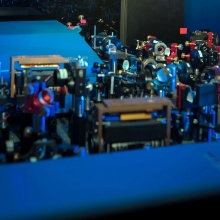“Establishing European leadership in the quantum sensing industry”. This is in essence the ambition of macQsimal, a new project selected by the European Commission for their recently launched Quantum Technologies Flagship initiative. In macQsimal 14 project partners from science and industry from seven countries will create new commercial opportunities by leveraging quantum effects to achieve unprecedented sensitivity, accuracy and resolution of devices for sensing and metrology applications.
The first quantum revolution resulted in groundbreaking technologies such as transistors and lasers, without which current computers, mobile phones and the internet would have been unimaginable. Today, the ability to manipulate fundamental quantum properties in systems and materials is paving the way for a second quantum revolution. A global race has begun to exploit the enormous potential of quantum technologies (QT) and spearhead transformative advances in fields such as health, security, transport, energy and environmental science. The €1 billion Quantum Flagship initiative from the European Commission aims to position the continent at the forefront of this second revolution by supporting projects that will unlock the full potential of QT and bring commercial products to the market.
Taking sensor performance to the limits allowed by nature
Quantum sensors are expected to be key enablers of the first achievements in this new technological era. They promise to drastically increase the performance of consumer devices, medical services and future applications in the Internet of Things. They might also likely be the door opener to entirely new opportunities which the world is yet to see. As part of the Quantum Flagship initiative, the macQsimal project will exploit the potential of atomic vapor cells to provide a new generation of highly efficient sensors. "Our novel sensors can, for example, measure certain substances in the air we exhale and in exactly which concentration they are present at which time. This artificial nose is ten times more sensitive than a dog nose and could revolutionize medical diagnostics," explains Tilman Pfau head of the 5th Physics Institute at the University of Stuttgart and speaker of the Center for Integrated Quantum Science and Technology IQST in Baden-Württemberg. The method, which Tilman Pfau and his team use for their measurements is called "opto-galvanic Rydberg spectroscopy". "With our lasers we bring certain molecules, e.g. nitrogen monoxide, into a highly excited state, a so-called Rydberg state. As soon as the molecules collide in the gas cloud, they are ionized. The resulting charges are counted and provide information about the number of nitrogen monoxide molecules in the sample," describes Harald Kübler, scientist in the project, the method. Subsequently, the scientists plan to use and test their sensor for the analysis of relevant molecules in exhaled breathing gas, for example the inflammation biomarker nitric oxide (NO).
Expert Contact:
Prof. Dr. Tilman Pfau, 5. Physikalisches Institut, University of Stuttgart,Tel: +49 711 685-64846, E-Mail


